Written by Terry Smith
Our site is reader supported so when you click a link to Amazon we may earn an affiliate commission.
UK’s best (strongest) weed killer TESTED on Lawns, Bramble, Thistle, Nettles, General weeds, and overgrown areas
This article was last updated on May 28th, 2022 at 9:51 am
It took me ages to nail the best weed killer available in the UK – I have been through weeks of testing now. With the different active compounds, most commonly glyphosate and sometimes mixed with pyraflufen-ethyl, it’s hard to actually know which is the strongest weed killer, or the best one for your specific needs (driveway, flower beds, lawn, overgrown areas, bramble and thistle, etc) so I tested the best weed killer for each one 🙂 What I found was, there are many different types of weed killer and what you should know before buying weed killer. So how do we really get to the bottom of which is the best and strongest weed killer? We test them harshly 😀 Here’s a look at the weed killers we’ve put to the test:
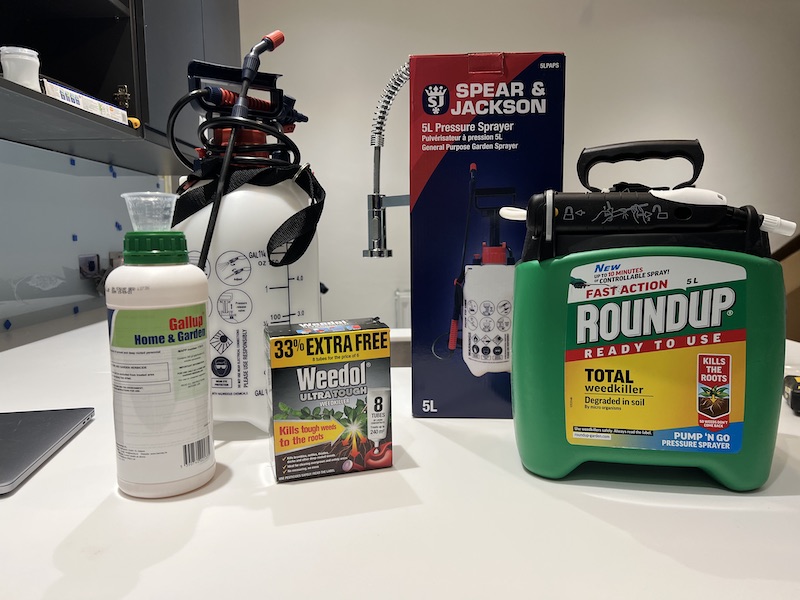
PRO TIP from extensive multiple tests: Most weed killers in this article will handle broad leaf and light weeds. Roundup and Weedol could handle nettles and thistles just about. Gallup on the other hand actually managed to kill a shrub in my test that I couldn’t dig out of my French drain!!!
We’ve tested these weed killers against each other properly with real before and after results. We’ve also included a couple of quick in between updates so you can see how each weed killer should progress and which is acting quickest as well as most effective against different types of weeds. I’ve run two tests. I’ve tested the best weed killer general weeds and I’ve tested the strongest weed killer for bramble and thistle as well as showing you how to safely and effectively use said weed killers! I also tested a completely overgrown area.
I’d recommend checking the tests as some are more effective against different weeds and it’s very interesting overall. However, if you want a short cut here’s the tested and proven best and strongest weed killers rated on strength and value:
Best (strongest) weed killers – professionally tested top picks:
Best weed killer tested and proven: Gallup best of the best (scientifically proven with the highest level of glyphosate – 360g/litre for home use) What you’ve got here is a manufacturer of commercial strength weed killer bringing the product to home gardeners at a bargain price. I’d call this a pet friendly weed killer too. Glyphosate is generally pet and child friendly once dried but please read my description and the manufacturer label to understand safety better – it must be DRY. It also was the only weed killer that killed a shrub in my tests
Strongest weed killer for home use [tested and proven]: Gallup Absolutely ideal against bramble and thistle.
Best weed killer for driveways and block paving [tested and proven]: Gallup, Weedol, and Roundup are great options. You want a systemic weed killer that goes right down to the roots and kills if your driveway or block paving is struggling.
Best value: Gallup to kill all weeds and Resolva for selective (lawns)
Easiest and safest to use [tested and proven]: Roundup is ready made so no need to mix yourself.
Best lawn weed killer: Resolva Lawn Weed Killer best for spot application. You could also consider a lawn weed and feed
Here’s a look at the video of these tests – the results video is part 2 so if you don’t want to waste time head straight to that, or if you don’t like videos – keep reading. I don’t think you need a video (not mine anyway they aren’t great) 😀 for this one but it was useful to remind me of the write up:
The best thing to do next is read the best weed killer test – you’ll be shocked just how good some are and I go through the test conditions too.
Testing the best and strongest weed killers in the UK:
What better way to test the best and strongest weed killers in the UK by literally lining them up against each other, applying them on the same weeds, (in rows) following the manufacturer guidelines in terms of how much weed killer should be used. We want to work out value too since I know all these work well. Here’s the tests I did:
I made a video of these tests if you prefer watching rather than reading – I’m not much of a video editor though I have to say:
What weed killers made the test this time?
I picked the products I know from personal use that deserve to be tested: Gallup, Weedol, and Roundup. These all have different forms but for this test I’ve selected a mix of granules, ready mixed weed killer, and easy to add liquid. I’ve also tested Resolva on Lawns.
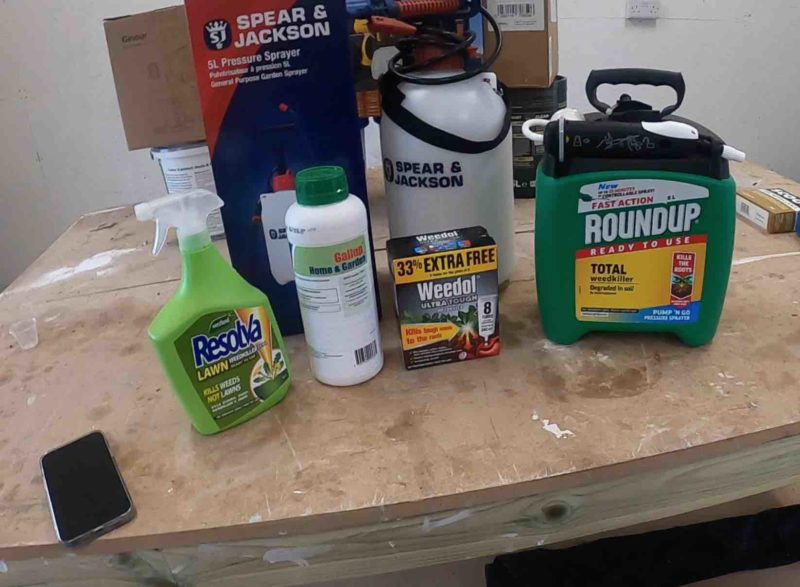
*Note to manufacturers: feel I’ve unfairly missed you? Feel free to email in with your ingredient list and I’ll consider you on the next update.
For now this is the cut and these are the best/strongest weed killers I am aware of in the UK.
What we are going to test.
So what we want to do is establish which weed killer is the strongest, acts the quickest, kills weeds fastest, and most safely for general weeds/grassy areas, brambles, thistle, and then I’ll try them on some more deep rooted stuff too! We want to see which will work best on general weeds and then what works best for brambles and thistle as well as entirely overgrown areas.
Once the more important facts from the test are established, we will then look at value for money as well as quantities required. And I don’t mean what the manufacturer tells you, I mean the truth from testing 🙂 what is actually effective.
Test conditions
Working out the test conditions is pretty easy.
We’ve got three very different products. The easiest is Roundup. This is just a pump and go sprayer – premixed and ready to use. And so dictates how we will use the other weed killers too for a fair test.
As a result of that being a pump sprayer, I think it’s only fair to use a pump garden sprayer for the Gallup and Weedol too – this is in my extensive experience of using weed killer, is the most effective anyway.
We’ve aimed for dry on the ground, and a dry full day from the point of spraying. Anything less than that and I would have gone at it again. We wanted a genuine understanding of what these weed killers can actually do after all.
Safety
Seeing as I am using a garden sprayer, I have picked not only a dry day for the benefit of how effective the weed killer is, I have picked a day with no wind. Now I am also keeping the nozzle pretty low to the ground to stop any potential vapour coming back up at me.
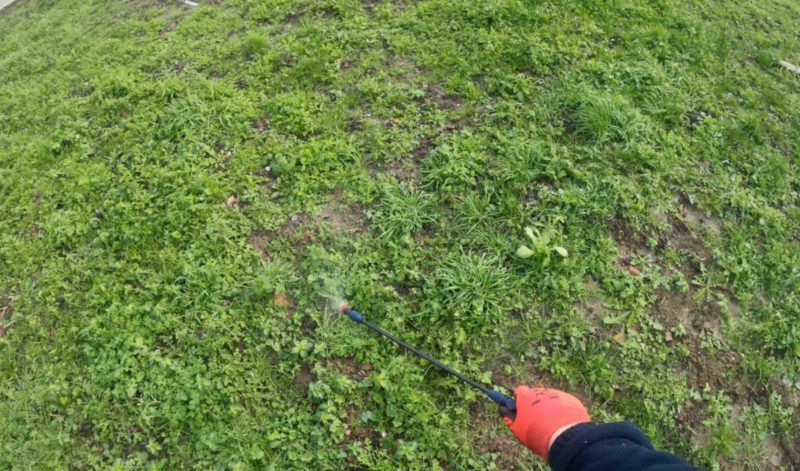
Needless to say I am not letting any come in contact with my skin and as soon as I finished the test I jumped in the shower to be sure – I prefer using the plastic disposable gloves or my workshop gloves I get free 🙂 , especially for mixing, but you could easily use your gardeners gloves or probably better, kitchen washing up gloves. Since I’ve a load of masks these days I tripled them up too. Might as well. Don’t want to sound like a wet drip but I had them available.
I used my trust Wellington boots and made sure to give them a blast down with the hose before putting them back.
Test 1: Best weed killer for general weeds/nettles:
The first test is aimed at knocking out the easier stuff like Chickweed, Fat Hen, and essentially nothing too hardy. I want to completely kill this area off and then seed as soon as it’s wiped out. So what I’ve done is divide this area into three sections and put some string lines so we can see which weed killer is most effective.
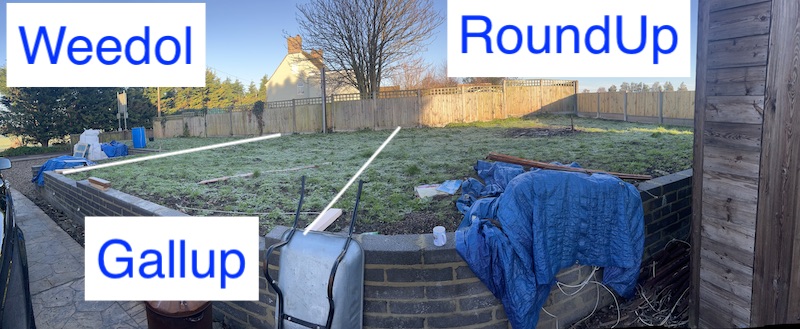
For the Gallup, you need 24ml per litre to treat up to 40m2. Now to be honest as much as this is a test, I am not mucking about here. I needed this area cleared. The area as a rectangle (25 * 8.7m) is just under 220m2. With the section at the front for car parking cut out it is around 170m2.
So let’s say that’s going to be 60m2 per weed killer. I’ve added 36ml of Gallup to 1.5 litres. Following the manufacturer recommended for concentration.
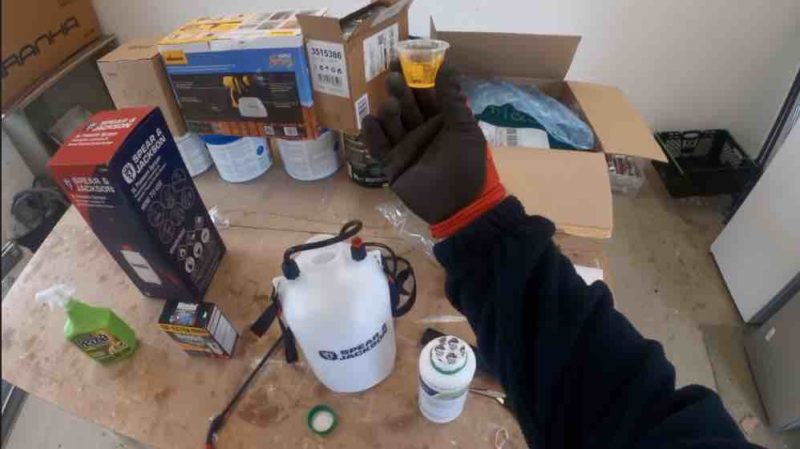
For the Roundup things are much more straightforward being a ready mix weed killer however they are very vague about coverage so I worked this out to be about 1.5-2 litres needed.
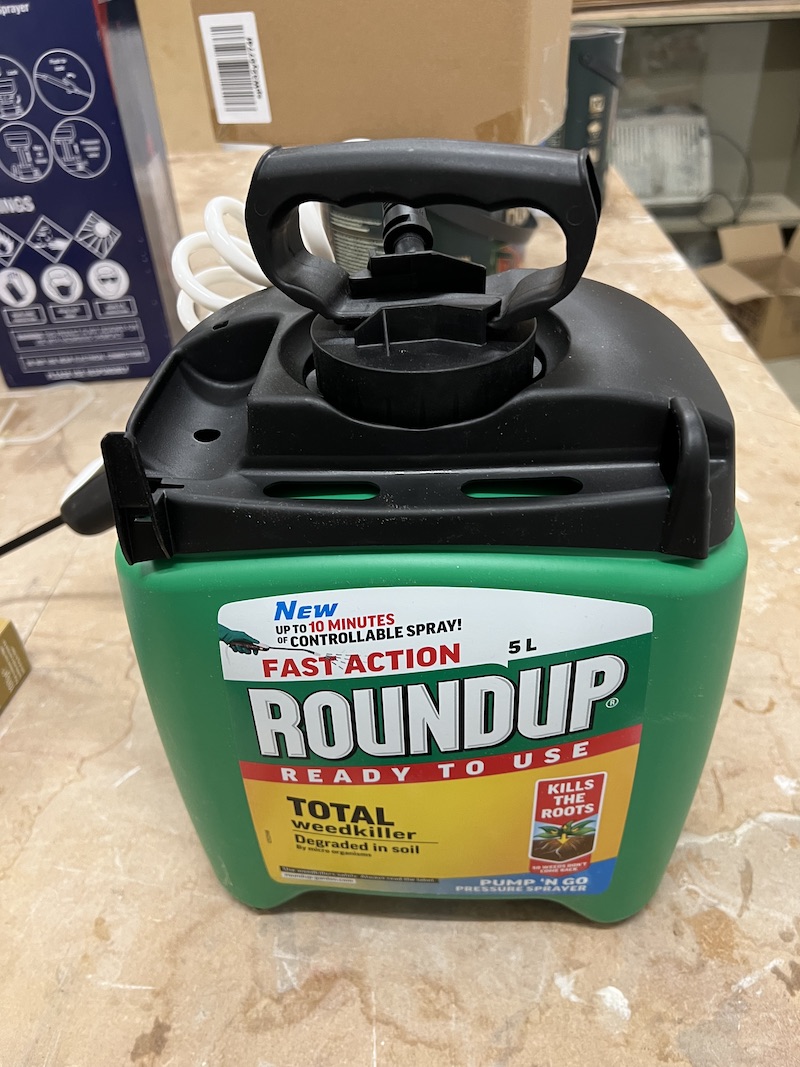
I came to this conclusion because the Gallup concentrate is 360g of Glyphosate per litre, that means of the 36ml we’ve got about 12 grams of actual Glyphosate. Since Roundup is already diluted to 7.2g of Glyphosate per litre that gives just under 11g of Glyphosate in 1.5 Litres.
Now you’re thinking about the maths, hang on a minute – Gallup is like 10 times better value for money than the RoundUp in terms of how much Glyphosate you get – well it is my top pick 🙂
The Weedol tubes treat 30m2 each and are designed to go into one litre of water – so we will load 2 litres and two tubes:
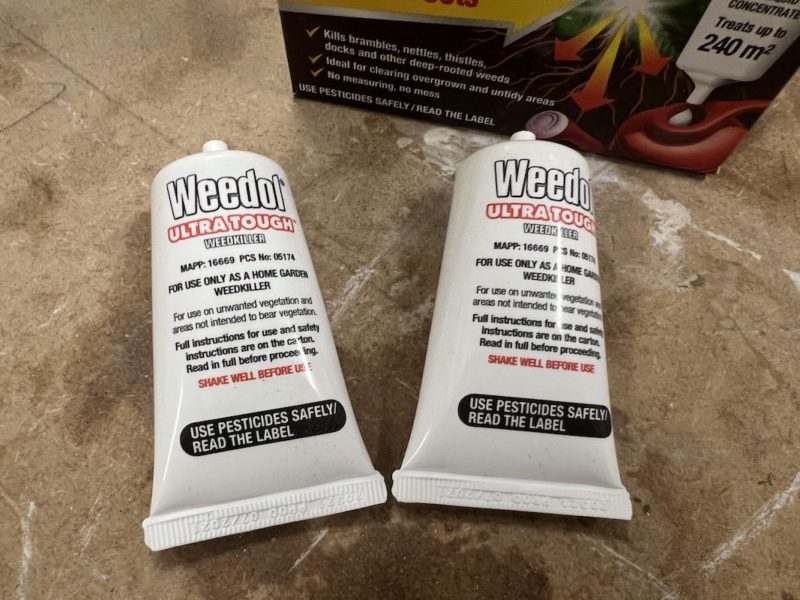
So I measured out the land area equally and spread the weed killer – what I noticed was I had reached the end and had plenty left over – so I gave the area another blast – I walked over a treated area which is the wrong thing to do – naturally I cleaned my wellies straight after!
I washed down my wellies as well as the garden sprayer after being sure to keep the chemicals out of our home!
So here’s a look a couple of days on. Remember they all claim to be fast acting! So I thought a two day update was worthwhile:
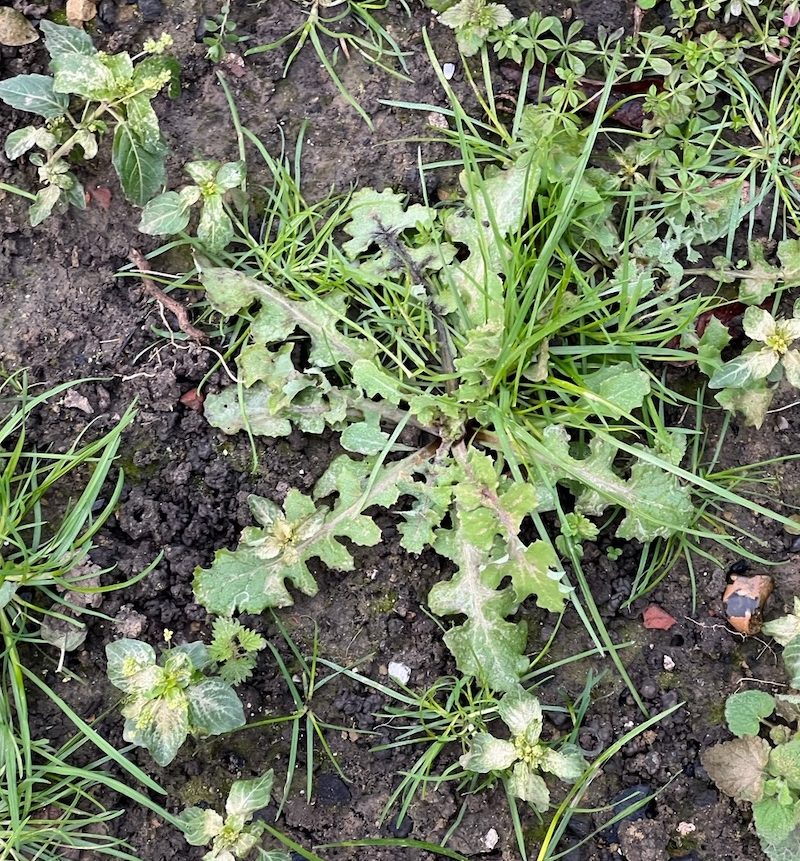
And here’s a look a week later. Things are really starting to look dead now.
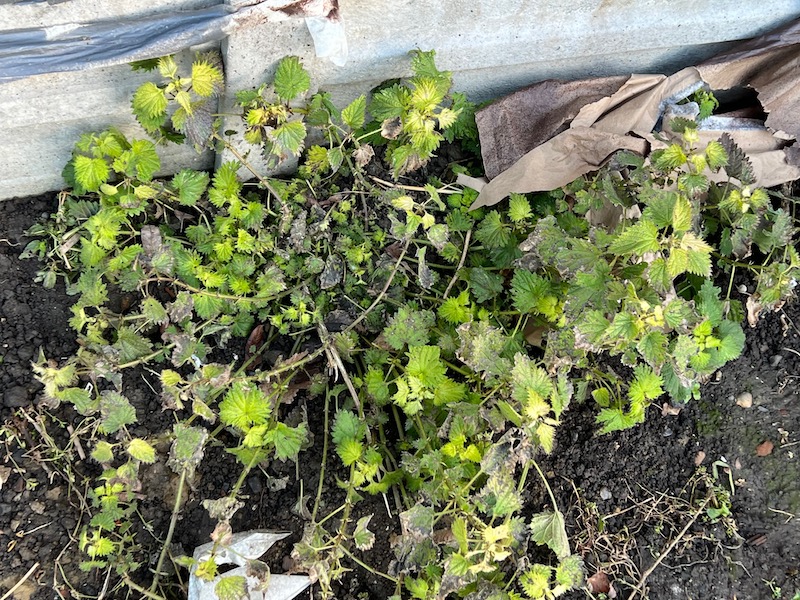
So where I wasn’t quite as liberal with the Roundup I did have a problem though – moral of the story is really douse this in weed killer:
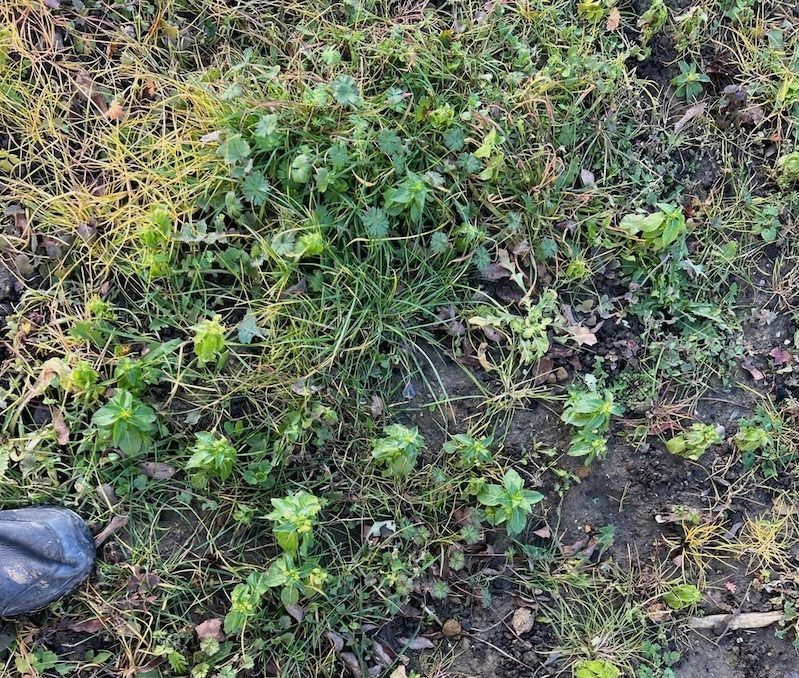
After a couple of weeks Gallup really got to grips with the easy stuff like grass and broad leaf weeds:
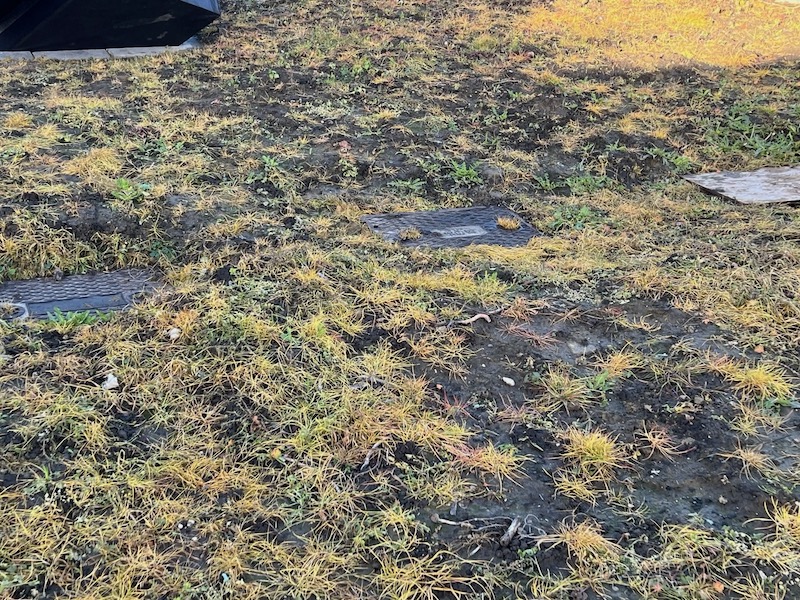
And two months later there was literally nothing left. I have to say I was very impressed by gallup and how well it performed. Pound for pound it was hard to beat:
UPDATE 2 months in: However, in the end, everything actually died. Gallup died first entirely making it the quickest acting. Weedol and RoundUp worked at pretty much the same speed. What became completely clear was they are all very effective on broad leaf and light weeds:
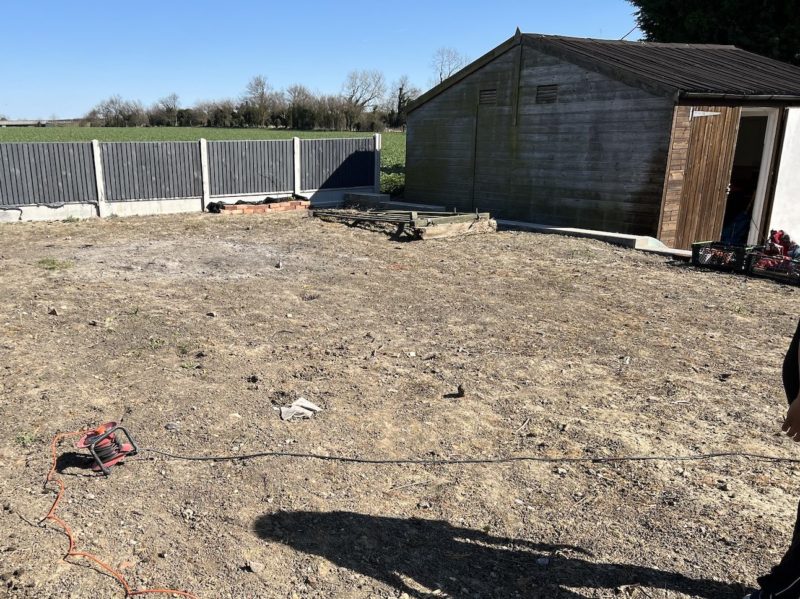
If you look up in the right hand corner you’ll see it’s greener – that’s the RoundUp which hasn’t caught up yet. Weedol did OK but wasn’t exciting to be honest:
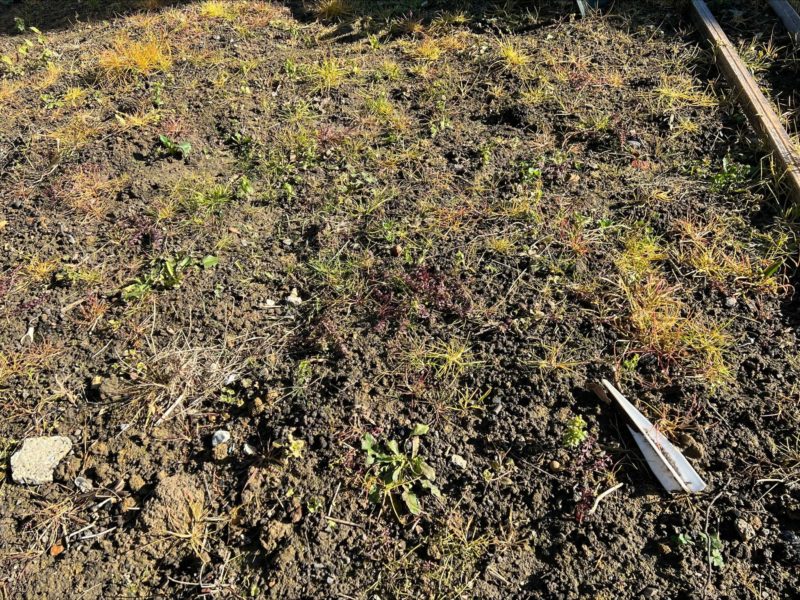
As you can see they’ve all been very effective on the less hardy weeds – don’t worry. They aren’t getting a buy rating that easily 🙂 On to the brambles and thistle test next!
Results
I think it’s pretty clear who’s won test one here in terms of value, but the best thing about an honest visual test is you get to make the choice yourself 🙂
Test 2: Strongest weed killer for bramble, thistle, and docks:
So for the thistle and bramble I have given less consideration to actual coverage and just blasted them down, saturating them in weed killer.
Here’s a look at the Gallups bramble and thistle patch after I’ve sprayed it and a couple of weeks has now passed, I haven’t seen good enough results on Weedol and Roundup to document yet. I’ll update when I can:
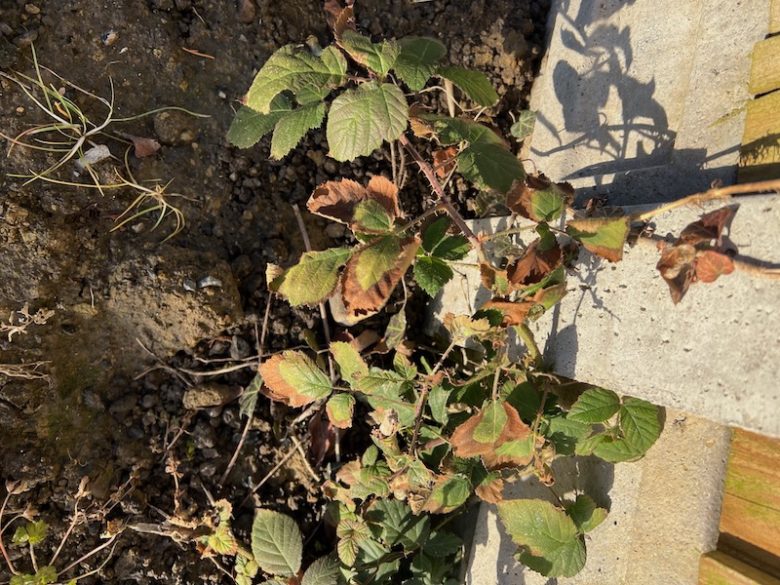
A few weeks after this I had no trouble with this bramble any more. I didn’t re apply either!
Test 3: Driveways and block paving.
An absolute killer isn’t it? Watching weeds blast up through your block paving. I cover this considerably in my patio sealer and patio jointing compound articles. If you don’t want to go for a complete purge you can try weed killer first. Be sure to understand the difference though, if you have moss growing then I would go for a specific moss killer ahead of a weed killer. Ignore that comment if it is indeed weeds, and let’s take a look at this test!
Update: still waiting on results for this!
Test 4: Shrubs and hardier plants
Now I’m well aware this isn’t designed for trees and shrubbery but I thought I’d give it a go anyway. Since from the first two tests I have established Gallup is seriously strong, I thought I’d give it a go on this shrub growing out of my French drain. If it doesn’t work I’ll cut it off and use some tree stump killer. Here’s how that came out:
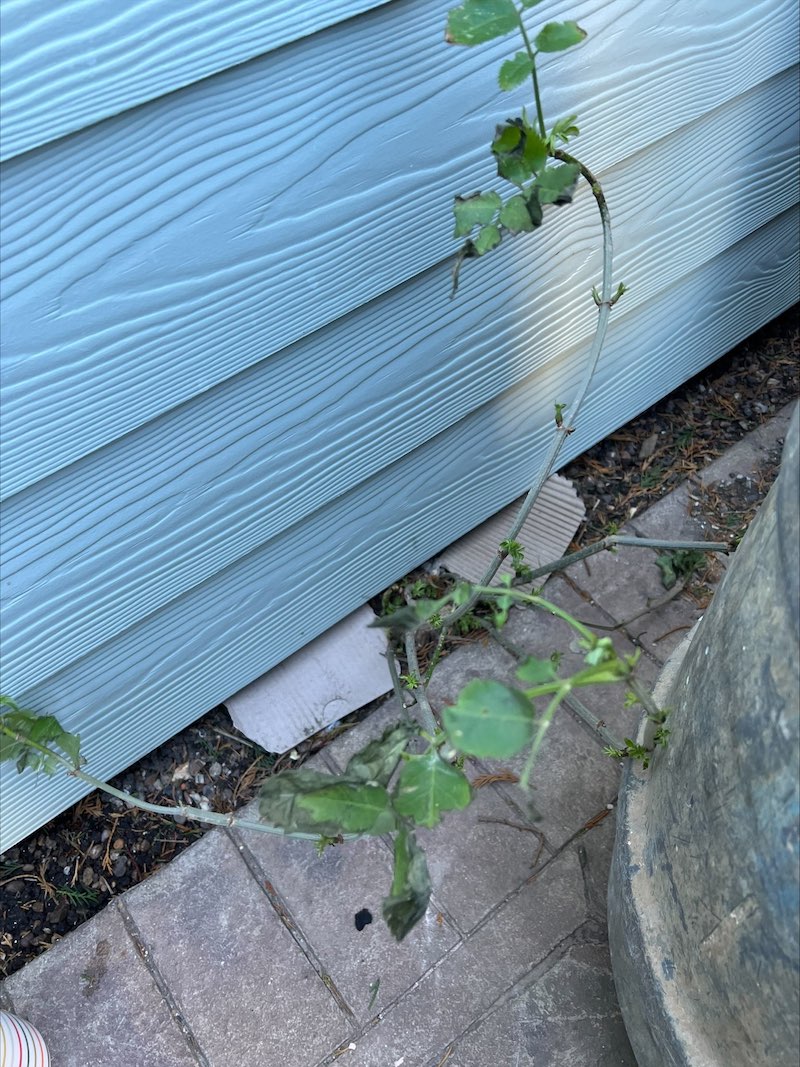
In my opinion it’s not dead yet but showing signs of struggling – I wouldn’t rely on it for a quickly result to be fair.
Edit * This took longer to take hold – about two months. Now it appears completely dead and I did not re-apply weed killer, just left Gallup to it’s course. I think it’s fair to say Gallup is the best value for money from my tests. This is mathematically proven:
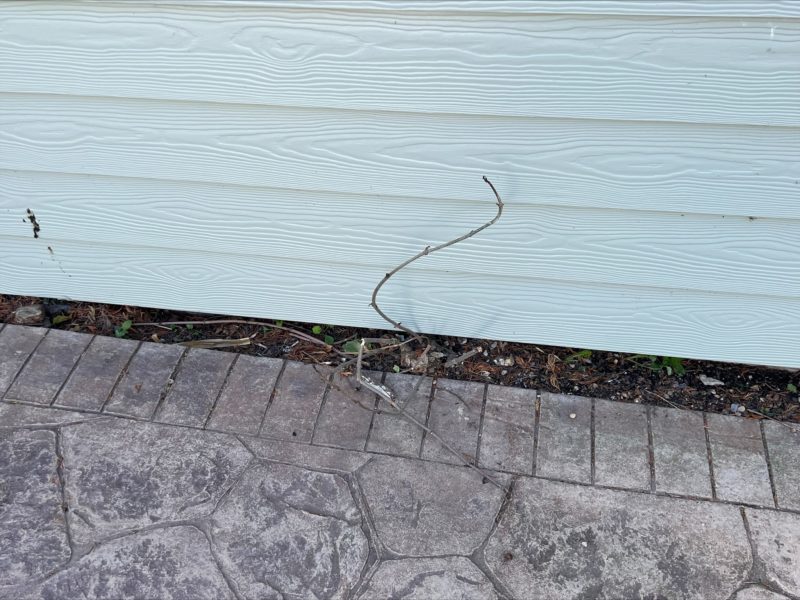
I think it took about three months to kill off a shrub. Very impressed!
With the testing out of the way – let’s take a look at what I learned. I put together a buyers guide based on my testing and years of experience that should help you considerably.
What you need to know before using weed killer
I know this is pretty trivial but the ultimate trick with weed killer is to carefully follow the instructions and BE PATIENT. Almost all systemic weed killers will take a while to work because the Glyphosate is absorbed into the leaf and then needs to travel to root tip in order to completely kill the weed. It will take up to a month but can be quicker and generally depends on the conditions. Never be in a rush and have a timed plan to keep things safe. The longer you leave to plant after application the better and seven days is the minimum.
Best weed killer for driveways and block paving
Based on price, ability to kill weeds, least staining and residue, safety for kids and pets, ease of application, reliability, and customer support, I make my choice looking for the best overall score.
For those reasons, in my experience, the Gallup home & garden glyphosate weed killer has this won by quite some way with price being a heavy factor. There’s no doubt it works great and probably has the best reviews over the internet as well. To tell you the truth, this probably isn’t that surprising given this weed killer is 360g per litre of Glyphosate. This is on par with commercial strengths and certainly much higher than other quality weed killers like Doff. It stands to reason that it’ll give excellent results.
Given the price differential at the moment it makes it a no brainer that you will be pleased with Gallup – it’s excellent value.
Safety first
Before we begin the process of application. It is essential you have a mask, goggles, and gloves. Always wear these and ensure you have tough clothing like jeans and some boots. It is not an exaggeration to talk about how dangerous these chemicals are. You only have to look at what they do to plants….
When you use your watering can or sprayer, ensure you thoroughly clean out afterwards. It’s also advisable to not put remainder down the drain so only mix what you need.
Keep kids and pets away from the garden after application until the weeds are completely dry. Do not cut corners on this, we are talking about a toxic product and the correct procedure needs to be followed in order that it is safe to use. Never take risks when the family is concerned.
Avoid spraying on windy days as this will increase the likelihood of ingestion as well as reduce the amount of product that is absorbed on the leaf. If you spot bad weather on the horizon, stop what you’re doing and wait for dry weather.
Protect wildlife
In terms of protecting wildlife the consensus is pretty similar. Mammals and birds are pretty much ok – the levels of Glyphosate won’t get high enough to cause problems but for some wildlife it is a problem:
You need to be very careful to make sure these weed killers don’t make their way into your pond. Killing your fish and aquatic life is a real possibility. It’s scientifically proven to cause embryonic development failure to aquatic life. So please be careful about allowing weed killers to run into water sources.
These weed killers are also lethal to bees – it peturbs their gut. For that reason using weed killer in Winter has its merits if you can find a dry spell. The bees won’t be about to be harmed. I am quite serious about preventing bee population decline and written on the matter extensively. For this reason, where possible, I would ask you to consider a weed burner or if generaly weeding, a weed puller or a hoe first.
Ideal time to apply weed killer
As with all weed killers, they generally work between March and November. Always check the packaging for specific dates but they should fall within this range. The secret is to apply weed killer in bone dry, hot sunshine. The warmer the better and if there has been no rain for a few days before all the better. Make sure you give yourself the best chance and check the weather forecast. A couple of warm days forecast in advance would be absolutely ideal to produce the most efficient results.
Generally you can use these product damp but it’s not worth it and you need to think about protecting wildlife and the environment. If you’re going to do it then do it right is where we need to be. This also means don’t clean your drive or patio prior either if you intend to use weed killer. The healthier the weed, the better these systemic weed killers actually work because healthy leaves absorb more toxin basically.
However, with that said if you check the link above there are some merits to applying in Winter as you’ll help the bees.
Understanding the different types of weed killer
There’s different weed killer for all types of application. From lawn weed killers, block paving and driveway, as well as just generally preventing weeds.
Systemic weed killers
This is where you apply the product to the leaf and it is then absorbed and slowly makes its way down to the root and kills the weed so that it will never come back. Gallup, Roundup, and Weedol are all in this category.
Selective
When a weed killer is designed to kill one weed and leave plants intact. In this article there are two; Weedol Lawn and Resolva. This is often the case with lawn weed and feed. They are specifically designed to kill weeds, kill moss, and fertiliser all in one.
Non selective
This is basically a complete wipeout – it won’t differentiate between weeds and plants – generally speaking these will be Glyphosate (the main weed killers I have extensively tested in this article).
Preventative
You can get weed killers that will stop weeds before they come. These aren’t the best if you are thinking of vegetables or flower beds as you’ll want to use the space at some point in the near future. I really don’t like this method myself – laying weed killer in the ground for the future is a dangerous game so not included in this review.
Are you just absolutely fed up of googling the best weed killer to find a random list on a rubbish untrustworthy website that seems to be nothing more than a forwarding service to some product they’ve found. Yeah me too, actually, that was how my website came about in the first place – tired of these illegitimate reviews based on ‘thin research’, I decided to set a new standard and do real testing. I was searching for the strongest weed killer myself, but same thing and not much difference I suppose. But before you go, you might want to look at the alternative pet friendly weed killer or an organic weed killer options too.
Now we know what we are looking for, let’s take a look at these weed killers
1. 2 x 1L Gallup Home & Garden Glyphosate Weedkiller
Gallup weedkiller is the strongest weed killer available domestically in my experience, that is after using all of the weed killers over the years in this review and my tests above underline the value too. It is super handy to have a commercial strength weed killer available for domestic use. It’s pretty simple to use too. Just add 24ml to a litre of water and fill a garden sprayer – it used to be 30ml when I used this before, but it’s now a bit more diluted. If you don’t have one yet following that link will really help. Assuming you have a nice sprayer with an extension and variable mist, it’s then really easy to use so I would definitely go with the Spear and Jackson pump action sprayer. Here’s a picture of of that sprayer:
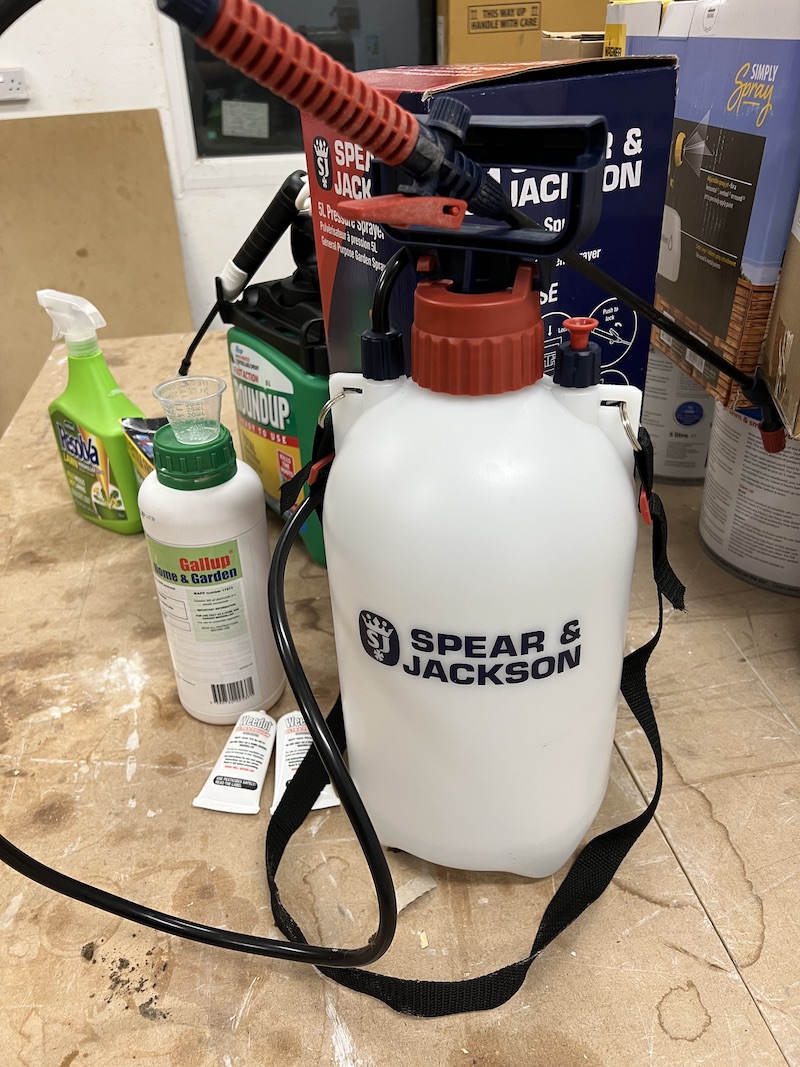
It can be applied without a spraying certificate and is exactly the same strength as professional weed killers (360g/l of Glyphosate). That pretty much sums the product up really. It’s really strong and it works great but there is a little more to discuss…
It’s actually so strong, it has no problem dealing with the nastiest problems like Japanese Knotweed and Ivy. If you have this type of issue then I would recommend using this product ahead of all others. If you have a large patch to clear then in about two weeks this will show tremendous signs of killing off most annual and perennials. Here’s a look at a two week treatment that you can expect from using the product:

And here’s what happens on Ivy:
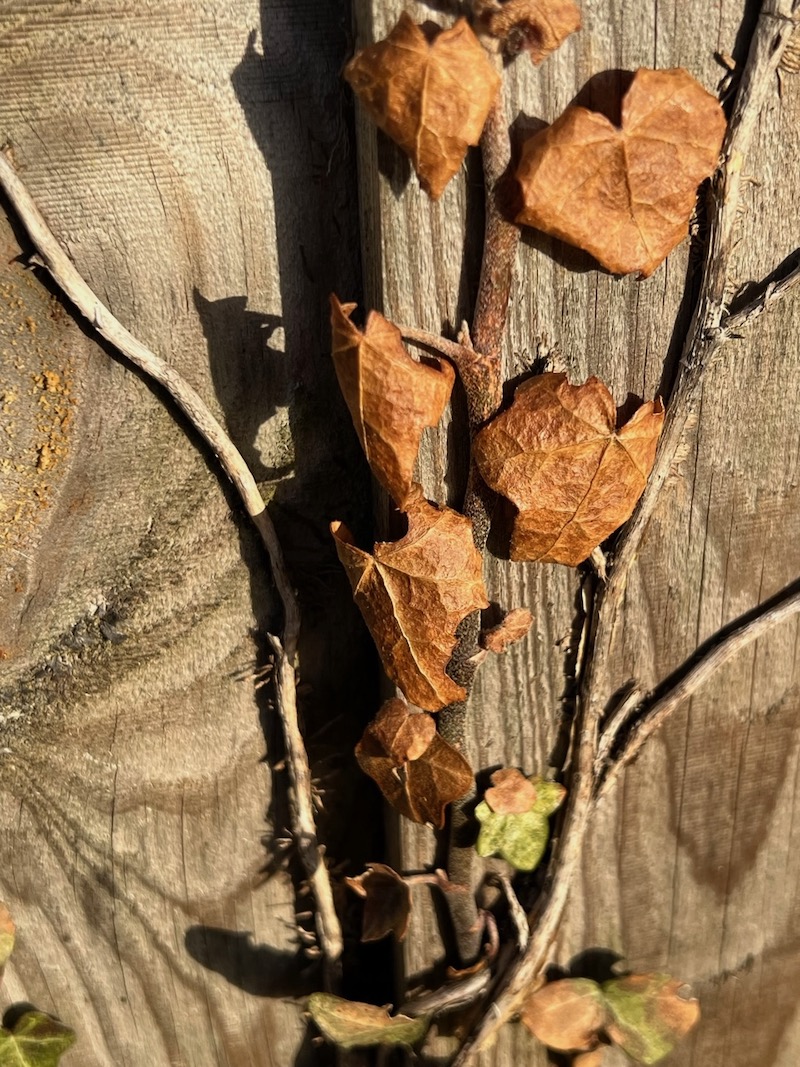
So as you can see, despite being half the price or less of the brand names in terms of how my Glyphosate you get, it’s easily as effective and in my opinion, probably more so, after all, Glyphosate is the main active herbicide. This will eventually end up double the price with a fancy brand attached. Fortunately for now though, we can grab a bargain. When I am looking for the strongest weed killer domestically, I go straight to this product.
In terms of application, a pressurised garden sprayer will make life a doddle – like the one in my test! Remember, this is extremely strong stuff so wear a mask and avoid windy conditions. Also, it goes without saying that you want to apply this when no rain is around. If it does rain shortly after application then you’ll need to pick another day that’s dry to re-apply, so don’t waste your time or the product itself. Plan well and aim for a nice sunny day.
Once it contacts soil and dry, it is neutralised making it a pet friendly weed killer ( and good for kids). That said, seeing as you will need a few weeks for the weeds to die off, there’s no rush to plant again. I would personally leave a couple of weeks minimum after application to begin planting to be on the safe side. That’s what I did with the area I blitzed – I am now waiting for a bit more warmth to plant grass seed. As a patio or block paving de-weeder, many having claimed it works wonders, some have claimed it leaves a stain that then needs to be cleaned itself – from my tests on driveways and block paving I didn’t see that staining but I saw superb results.
However, to be fair on the staining thing, I think this is a common problem with all weed killers on porous brick. My personal experience was the block paving came up just fine after I used a pressure washer. I don’t have anything overly powerful, just the WORX cordless pressure washer. Definitely blast your patio clean or use a patio cleaner before you use a patio sealer or you’ll trap in any stains…Also before sealing, make sure to use patio jointing compound, grout, or sand – it’s a pre-requisite to sealer.
To reiterate the safety thing, the same rules apply to this weed killer as all others in the review. Once the area is completely dry it’ll be OK for children and pets. This is the manufacturers guidelines and it’s reasonably inline with all other major brands with the active ingredient Glyphosate. From my personal testing I am a worrywart. I kept the kids off for a bit but the science says otherwise. I would take no chances though, I would wear a mask and goggles then pick a warm day with no wind at all to apply. This will give the best and safest results.
Pros
- Super strong weed killer
- Probably the strongest weed killer domestically
- Super well priced
- Works like all Glyphosate based weed killers
- Treats hardy vines like Japanese Knotweed and Ivy
- Suitable for more patio, block paving, and driveways
Cons
- So popular it’s often out of stock!
2. Scotts Miracle-Gro Roundup fast action weedkiller pump 'N go ready to use spray, 5 L
When I first wrote this article years ago, the Roundup fast action weedkiller is easily one of the most powerful all purpose weed killers on the market – not a lot has changed hence the inclusion in the tests for best weed killer in the UK! For a while I had Roundup ranked top but wasn’t my actual top pick. That is the the Gallup offering, but it went out of stock early on in covid times but now back with an array of sellers so it’s back to second spot for RoundUp! I’ve still included it in the review because once available again, it really does work as far as non selective weed killers go.
There’s a few obvious reasons why I like Roundup. The package is ultra handy. Having its own spray applicator is a big win. If you’re doing this for the first time then you won’t have a pump pressure spray gun. A decent one that you trust to hold weed killer would set you back £25 alone. So buying this setup is ideal. Plus there’s nothing stopping you re-using this sprayer once empty with refills. However, on the downside it does not have as much power as the Spear and Jackson I use above. In fact, for larger areas you may become a little frustrated. It works just the same though with the pump pressure and hand lock to carry it:
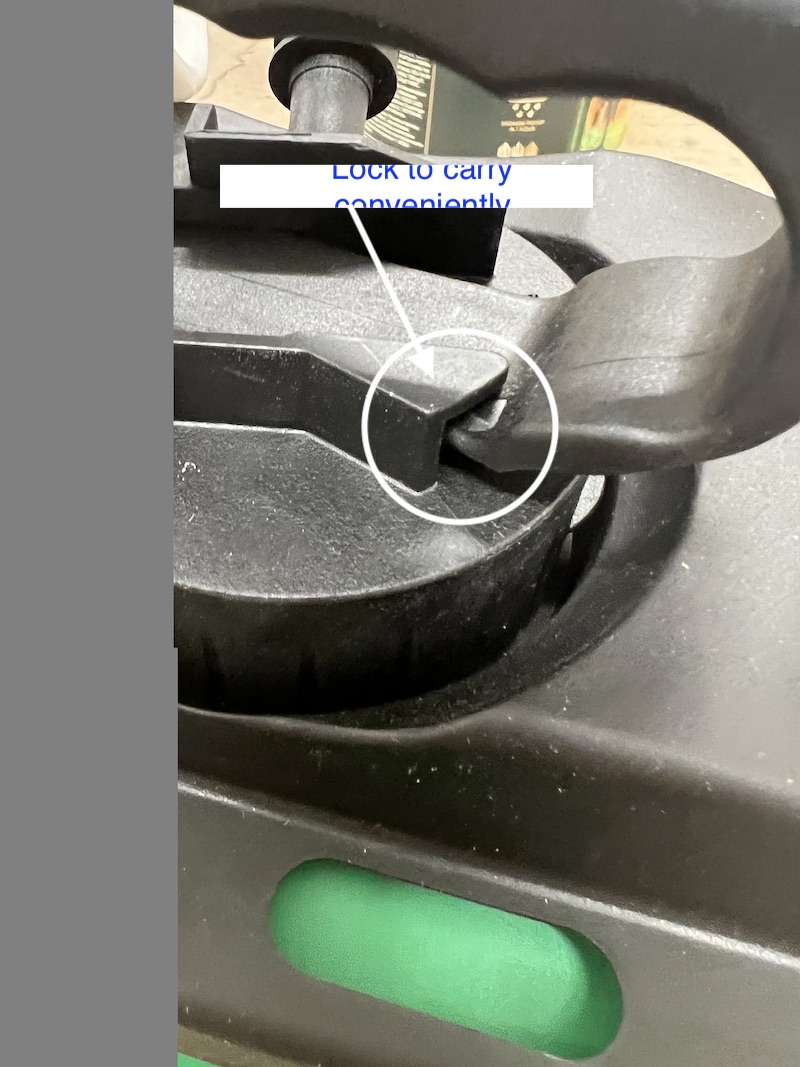
There’s also a pretty decent trigger lock which means kids can’t tamper with it. There’s just no way they’ll get it open, it took me a few attempts 😀
Fast acting is no gimmick. When it comes to results this really works. Like with almost all top weed killers it relies on Glyphosate which works to attack weeds both above and underground. Amazingly, their 48 hour claim is legitimate. You will start to see the weed literally wilt within a day or two depending on how hardy. It’s a little misleading though in the sense that the weed itself lives on for up to a month. And from my personal experience using this product myself, hardy deep rooted perennials take longer to show signs of giving up. Eventually they’ll die at the roots but this was the largest cause for negative feedback I have found with my customers to date too.
Obviously when a product claims to be fast acting within 48 hours you naturally assume finished, so can be a little disappointing. Never fear, it’ll work alright! From my experience, it works really well on both annual and perennial weeds. It’s particularly effective against your normal problems like stinging nettles, dandelions, and even hardier thistle. With the deep rooted weeds you’ll find they take longer to die off, don’t lose faith. Glyphosate is an incredibly powerful chemical and does it’s job well.
You’ll get about 150m2 of coverage, probably less if it hardy weeds as opposed to quick growing annuals. In any case one or two bottles will do most gardeners.
They claim it becomes inactive on contact with soil and dissolved by soil microorganisms. While I have no reason to doubt this, I would not replant vegetables in a hurry. While the WHO said ‘it’s probably carcinogenic to humans’, Euro scientists more recently found otherwise; that it is not a carcinogenic to us. How I read that is err on the side of caution. I would personally give it a couple of weeks and not the 7 days as Roundup stipulates. It’s nothing personal either, I just prefer safe over sorry and given gardening is about planning and the long haul, it shouldn’t make any difference to using this product if timed right!
One other useful point of reference is the spray nozzle. It works far better as a spot weed sprayer so to speak, rather than a fine mist sprayer to kill large patches. This is quite useful when aiming at weeds in block paving or areas on driveways.
Lastly before we look at pros and cons, the manufacturer suggests once this is dry, your pets and children will be ok. Please really ensure you allow ample drying time. A real handy tip here is to pick a time after a few days of dry weather and then ideally no breeze but we will go into this further in the weed killer user guide.
Pros
- Cost effective with its own spray nozzle.
- Child and pet safe
- Great all round use
- Well priced
- One bottle lasts a mid size garden a summer normally
- Breaks down in soil in 7 days
Cons
- Occasional reports of weeds not dying (normally time issue)
- Nozzle could adjust a little better
- In my opinion, not quite as miraculous as the sales pitch makes me feel, but still a super product.
3. Weedol ultra tough weed killer liquid concentrate
Here’s another great weed killer. This time it’s an offering from Weedol. I am going to go right off the bat and say this is an incredible product in testing.
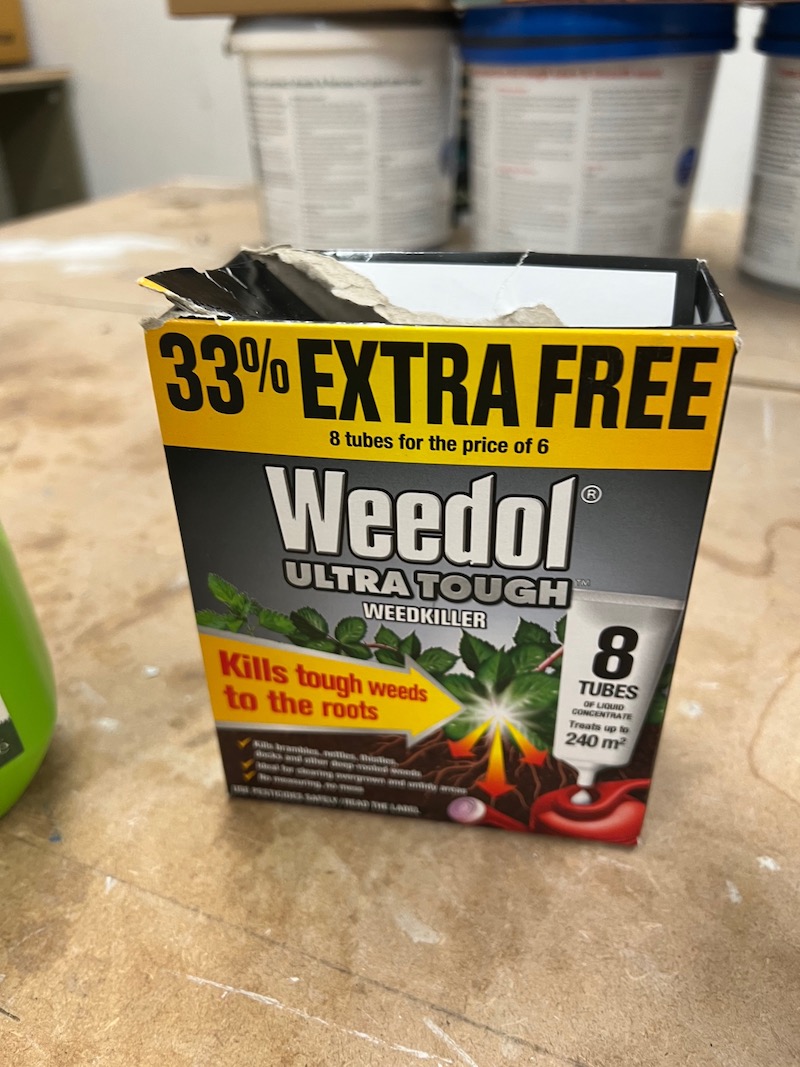
You can use this weed killer to kill Brambles, Ivy, and other woody shrubs. But, don’t expect it overnight. This is a product for someone with time on their hands. The manufacturer suggests 28 days for weeds to die. I will happily tell you it’s taken longer myself when using this product. I still really like it, don’t get me wrong but be aware you need to be patient – a few weeks in and everything starts to look yellow-ish:
Almost all of my customers that have complained about this product have done so within a couple of weeks of purchase. You really need to give it a chance and watch the magic. The best bit for me is when the plant begins to die, it’ll pick up speed and things happen quickly then! Being a systemic weed killer, it absorbs through leaves and then circulates to the roots. This process takes time but works.
The trick with Weedol is to follow the instructions carefully. I would almost say it’s turned out to be a downside that it is so versatile. That in itself makes no sense but it seems following the instructions is difficult for some so lets prep you so you make this product work well. It can be used with a pressure hand sprayer or ordinary garden watering can. You want to make sure you use a fine rose if the latter.
Here’s where you need to start following. For a start it needs to ideally be summer months but could be April to November. Personally I get better results, the warmer it is. If the bottle sprayer, add one tube to 1 Litre of water. Then you should aim for about 30 metres squared of coverage on annuals like Chickweed and Fat Hen. If it’s a perennial like Stinging Nettles then expect to get around 20m2 as you’ll need to douse the leaves thoroughly. This reduces still to around 10m2 in my experience with bramble. Basically the hardier the weed, the more the mixture will need to be absorbed through the leaves.
So this is where it gets a little tricky. With a watering can you want to change the ratios completely. This time it is 5 Litres of water per tube. Everything else remains the same. Now from my perspective this is great because it really helps to kill large patches of weeds. Using the watering can is a great way of getting decent coverage on large areas fast. It works brilliantly for gravel areas with weeds poking through annoyingly or ground clearance before your Autumn or Spring dig. I think this is probably a better solution than the review above for larger patches and certainly better than the standard Weedol. I would take Weedol Ultra Tough every time for the tough jobs.
It’s pretty good for children and pets. In fact, it is exactly the same as Roundup. It also contains Pyraflufen-ethyl which is a legal product in the UK but not all of Europe. So it’s considered nasty stuff. But then again it would have to be in order to kill plants…Make sure that it’s bone dry before sending the kids out and you’ll be OK. They recommend allowing 7 days after application for planting but I always like to leave a couple of weeks. In any event, if you have tackled hardy weeds, they may not be dead for a month, so plan the treatment well, then it’ll be no hindrance at all to wait a little to feel more confident about planting, especially if it’s edible! And please, do not forget to wash out your watering can after!
Overall this weed killer is worth its money and works well with good time planning
Pros
- Kills to the roots
- Will kill Ivy and hardy bush
- Can be applied with watering can or spray bottle
- Strong mixed use weed killer
- Great on gravel driveways
Cons
- The versatility leads to confusion in following guidelines
- Takes a month to see great results on hardy weeds
- Probably not as effective as Gallup when in stock
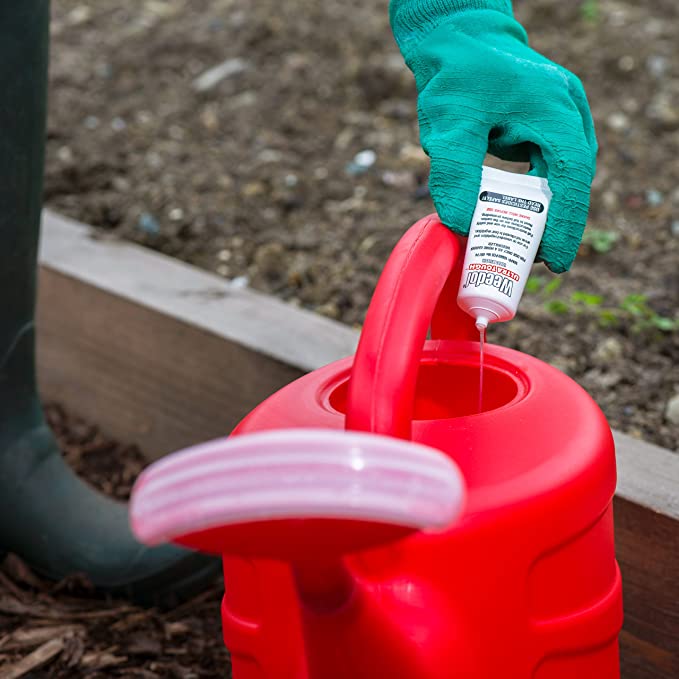
4. Doff Glyphosate weed killer concentrate, multi-colour, 1 litre
This has become a reliable product over the years. Well known for its strength and qualities as a systemic weed killer. Although there is only a litre, you’ll effectively treat over 300m2 from my personal experience. The sales pitch is that you’ll get 416m2 but I tend to use it for tough weeds that need re-application a few days later to ensure the leaf is able to absorb enough to get into the plant, right down to the roots.
Generally I use 50-60ml per litre and have no trouble killing weeds off over a period of a few weeks. The lighter stuff will die more quickly than this too. I find the easiest way to apply this is with a portable garden sprayer. If this gets a day drying time after application then I have only had excellent results.
Overall I prefer the Gallup based on value for money but both products work well and this would probably be my second choice as it’s pretty good on Dandelion, Willow Herb, and most grasses.
Pros
- Kills most weeds and works on Ivy
- Suitable for gravel driveways
- Works on artificial grass but do a test patch first
Cons
- Little bit pricey compared to top pick
5. Resolva Lawn Weed Killer
All day long I pick Resolva as the best lawn weed killer. The only rival is has is the Weedol Lawn Weed Killer, and I know I shouldn’t have a bias, but I have featured them already so want to talk about Resolva, seeing as they are direct competition and doing practically the same job but in totally different ways:
The Resolva is a spray gun that is already mixed and ready to go. The idea is quite simple, in the warmer months (Mar-Sept) simply spot apply this to the areas of leafy weeds. This is the main difference with Weedol lawn killer actually. They want you to mix up into a garden sprayer and hit the entire lawn. As a result it’s hard to tell which is more value other than to look at it from a meterage basis – you’ll get about 50m2 from a spray bottle vs 600m2 from the Weedol concentrate.
Hang on a minute before you throw your arms up in the air and ask me why I can justify giving this the best pick ahead of Weedol. Well for a start this is designed for spot application and 50m2 of spot application equates to many many more m2 than the Weedol and I think at these concentrations Weedol is struggling to kill things like Dandelions, I know this from using it myself.
So what I’d say is this, if you want to spot treat, you pick Resolva, if you want to blast the whole garden then maybe not. However, if you’re lawn is a mess and full of weeds, don’t look at chemicals for the solution, go to a lawn scarifier instead is my experienced on this.
In terms of active herbicide the Resolva weed killer uses it’s the old it goes for the old mecoprop-p and dicamba combo. Here’s the safety sheet if you’re interested but there’s nothing out the ordinary – safety wise: respiratory kit, don’t get it on your hands and definitely not in your eyes – with regards to wildlife, you don’t want this going anywhere near your pond or water sources like all the other weed killers.
They claim to be able to hold off Nettles and Thistles. I have to say from experience and testing that you’ll have to annihilate your lawn by putting on so much Resolva, if you have those issues in your lawn then you shouldn’t be looking at weed killers. For broad leafed weeds in the lawn, this is spot on, otherwise it’s a no go in my opinion.
6. Weedol 1 litre Lawn Weed Killer Concentrate Liquid
No question, Weedol Lawn Weed Killer is every bit as good as Resolva, it even comes in a hand spray bottle so no mucking about. The active ingredients are completely different though: MCPA, Fluroxypyr, and Clopyralid. These ingredients lend themselves to more toward dosing the entire lawn evenly and without too much concentration in any area. In fact, if you treat this as a spot treatment and go too heavy, the results will be an annihilated lawn !
If you’ve got a few broad leafed weeds poking through, and theres the potential on the horizon for a big outbreak, or looks like weeds are gathering pace, I would definitely give this a go. In contrast to the Resolva which is designed to spot obliterate weeds.
It’s pretty easy to use – just drop 15ml per 5 litres of water if applying with a watering can – personally I like to use a garden sprayer so the ratio changes to 15ml per litre – as far as I’m concerned, more water and dilution means less MCPA and Fluroxypyr that settles on the leaves. I have to say though, the watering can method is less vapour so probably a bit better in terms of safety:
The same rules apply in terms of application – make sure you don’t let any get into water (ponds specifically) and do wear your respiratory equipment, especially if you’re using a garden sprayer.
I have to say there’s no right or wrong answer in the battle between this and the Resolva – I just want to bring you an unbiased and well rounded, tested product review 🙂 IF you want to spot treat pick Resolva, if you want to blanket take a shot at the weeds in your lawn this is the better pick.
If you’re an avid gardener tackling weeds for the umpteenth time you’ll know the best weed killer for UK use will vary significantly. If you’re a beginner you can easily trip over and make huge mistakes that’ll lead to bazooka everything rather than just the weeds.
What are weed killers and what weeds can they kill?
Weed killers are products that are used by gardeners and farmers to get rid of, and control the growth and spread of, unwanted plants, better known as weeds.
The list of plants that qualify for this ‘weed’ moniker is actually quite long, with everything from dandelions to lichens, and a whole lot in between, featuring on it. Weeds can pop up on your lawn, in your flower beds and borders, along your garden path, and even on your patio and decking, so it’s no surprise that there are so many different weed killer products to choose from.
Most of these products, however, are based on the same chemical called glyphosate as it is incredibly effective at killing pretty much all kinds of weeds, and doing so quite efficiently. The downside to glyphosate is that it is a little ‘too effective’ and will also kill any other plant life that it comes into contact with, as well as being able to cause humans physical harm if not used carefully.
In recent years, there have been more and more weed killers that are advertised as organic, or pet safe, being brought onto the market. At first glance you might think that these two labels mean the same thing, but they don’t.
Some ‘pet safe’ products still contain harmful chemicals, but are designed to dissipate quickly and so the area becomes safer for pets to enter after a certain length of time. Organic weed killers are usually based on acetic acid (basically vinegar) or something similar, and so are the safest to use, for yourself, family, pets, and your garden, but they are not usually as effective as glyphosate-based products.
There are also products out there called weed and feed, and these are usually good for lawns as they are a mix of chemicals that can kill weeds but also fertilise your lawn, giving you the best of both worlds. The effectiveness of these kinds of products does vary quite a lot from brand to brand, so watch what you spend your money on.
Possible problems with weed killers
As weed killers are essentially poisons, not to mention toxic is most cases too, there is a lot that can go wrong when using them. This is why you should always follow the instructions on the products packaging, and also wear protective clothing like gloves, a mask, and even eye protection.
You need to be very careful where you spray the majority of weed killer products, as it only takes a little, accidental, splash in the wrong place and you prize flowers and vegetables can easily become collateral damage.
Even your lawn can be irreversibly damaged by using the wrong kind of weed killer on it, so it’s important to do your homework before buying and applying any product. There are weed killers that are designed to be used on lawns, just as there are ones designed for patios, paths, and other areas and surfaces, so be sure to buy the right one for your needs.
If you have young children and pets that like to play in the garden, you need to get a weed killer that will dissipate quickly and become harmless, and you need to follow the manufacturer’s instructions on how long to wait accurately too. If not, it could lead to poor old Fido, or even your kids, coming to harm from leftover residue.
If you’ve read customer reviews of weed killers, you’ve probably seen that there is often mixed feedback from customers. Sometimes, these differing results are caused by people applying the weed killer in different conditions. For example, if you spray some weed killer but then there is rain later that day, or even a day later, you will probably find that the product is less effective than when applied during better conditions.
Example of using weed killers
As I just mentioned above, the conditions under which you apply a weed killer can affect its performance considerably. I was told this when I first started out gardening and so, when it came to my first time using the stuff, I waited until there was little chance of rain, and gave those weeds a good spraying.
After a few days I didn’t see much change in the state of the weeds, but the old guy who’d advised me about the weed killer and weather conditions also told me that patience is often key too, so I waited. However, after a week nothing much had happened so I went back to the place where I bought the weed killer and told them I thought there was a problem with it.
The person working there was actually very knowledgeable, and he smiled when I told him this before asking me if I’d watered the weeds a little before spraying. Of course, I told him that I hadn’t as I wanted the things dead, not growing and thriving!
He then explained that we had recently just had a particularly dry spell for the last few weeks, and that the weeds would be reacting to drought and this can make them less likely to absorb the weed killer. Therefore, giving them a light watering for a day or two before applying the weed killer should help.
I went home and followed his advice, and wouldn’t you know it, this time it worked wonders. So, if ever you’re having problems getting a product to work as expected, keep my little story in mind. You don’t want to apply weed killer in wet conditions as it will be washed away and run off, but you also don’t want to spray in drought conditions without watering the weeds a little first.
The ideal conditions are after a shower, but when you know that it will be dry for a couple of days after that. At this time, the weeds are receptive, and it also gives the weed killer time to be absorbed and do its job effectively.
If you want a weed killer for the lawn, it will be nothing like a weed killer with a ‘one purpose fits all’ product with super strength designed to eradicate weeds in your driveway or block paving for as long as possible. So we will take a good look at the best options available for each different application and below the review of each product you can find a useful buyers guide which will help you ensure you have the right weed killer.








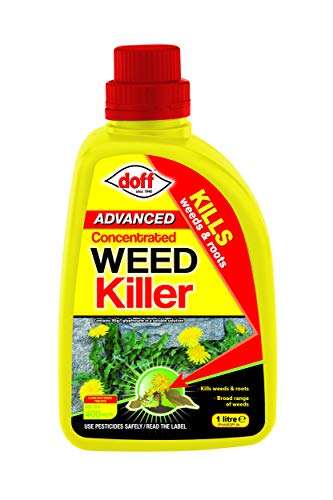





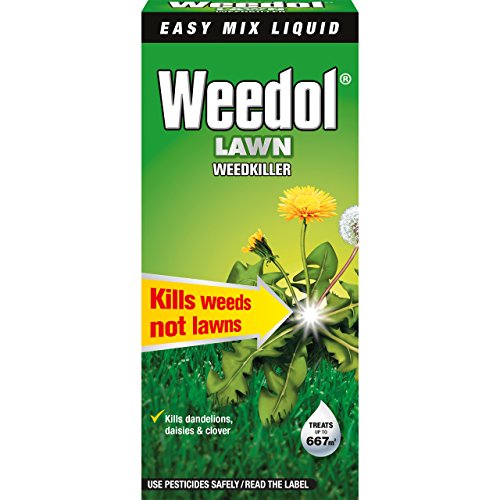


Hi very interesting but did not read to the end as I was looking for Marestail to be mentioned. Did not see it. I have used and am trying different weedkiller. I may be applying it wrongly. Having read the skin is very difficult to penetrate I cut the plant to about 3″ and spray. I st year no further growth but surfaced again this year. Tried a different brand same method but now see new growth so trying again uncut. Have you considered testing for this very difficult weed?
Hi Max,
Mares Tail is just a slightly different chemical breakdown but by no means stronger than my top recommendation: 160g/l 2,4-D + 240g/l Glyphosate. 2,4-D kills broad leaf but struggles on basic grasses but there is some research that suggests 2,4-D antagonises Glyphosate I am yet to find basic weeds can’t be killed without 2,4-D which has many research health warnings, and isn’t really exciting to me in weed killer terms. It’s also considerably more expensive at a retail of fifty quid a litre!
By contrast my recommendation of Gallup which is 360g/l of Glyphosate is a pet friendly weed killer when inactive . And in terms of serious strength, this actually killed off a small shrub in testing.
Regards
Terry
I’m in southern Spain – so everything dies down in July/August then bursts forth in November. I’m looking to treat a largish area (4000sqm) for broad leaf weeds. I’m not sure how much actual grass there is so am planning on sowing drought tolerant grass once the weeds are weakened. I’ve also read about pre-emergent and post-emergent weedkillers – so I’m thinking I need to kill the weeds that are there now (post emergent?) and then put pre-emergent down over autumn/winter to stop the new growth – then sow the grass in the spring? Any advice would be appreciated😊